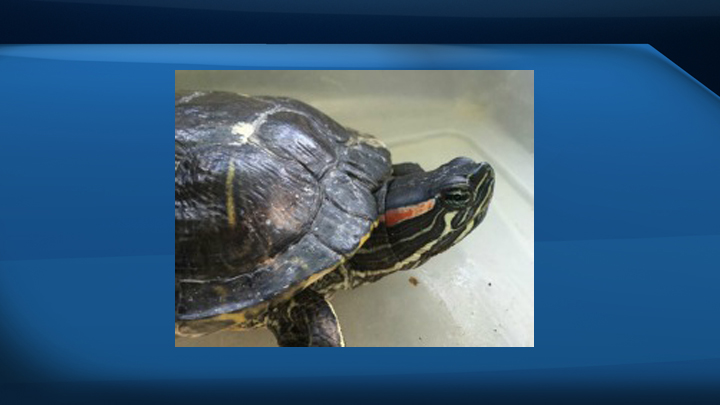REGINA – A specific breed of turtle keeps showing up in Wascana Lake, prompting a plea from researchers to refrain from releasing pets into the wild.

Researchers from the University of Regina and Wascana Centre Authority are asking people not to release their family pets after finding red-eared slider turtles in the lake. They’re popular pets but are not native species to this part of the world.
The release of non-native species into the wild leads to ecological and conservation issues.
“We’ve found evidence of multiple sliders in Wascana,” says U of R Biology student and researcher Kelsey Marchand who is part of a team conducting research on western painted turtles which are native to Saskatchewan.

Get breaking National news
“Released pets harbour bacteria and diseases that native turtles cannot defend themselves against. Also, pet turtles may not have what it takes to survive in Saskatchewan, so releasing them is actually cruel.”
This summer Alberta’s provincial government launched a ‘Don’t Let It Loose’ campaign after several reports of ornamental fish in the lakes and rivers.
The fish being released are not only surviving, but are also growing in such big numbers they are threatening the native species.
“This is a pervasive issue,” says Dr. Chris Somers, Associate Professor of Biology and one of the supervisors of the turtle project at Wascana Centre.
“I don’t think many people in Saskatchewan realize just how important it is.”
In June, the research team picked up a Mexican black kingsnake near Estevan after it was released into the wild.
“In general, it is a humongous issue,” says Chet Neufeld, chair of the Saskatchewan Invasive Species Council, a non-profit organization which receives support from the Provincial and Federal governments.
“A single species could proliferate to the point that it will have noticeable detrimental effects on the province as a whole.”
The group is reminding people that if they can no longer look after their pet, please do not release it into the wild but rather try to find someone who can provide the animal/species proper care.








Comments